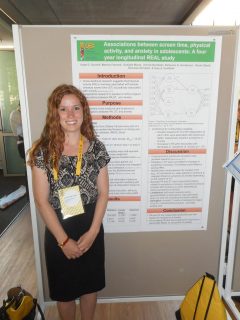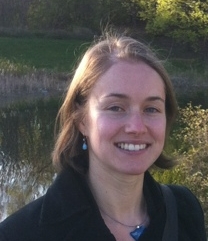Health research at Carleton University is growing within many departments across faculties. Researchers are generally aware of the health-related research within their own department, but our research would be enriched and have broader application if we were able to identify potential collaborators we might never otherwise be exposed to because their disciplinary home is distinct from our own. In attempt to support interdepartmental collaboration at Carleton University, Assistant Professors of the Department of Psychology, Katie Gunnell, Rachel Burns, and Marina Milyaskaya have collaborated with the CHAIM Centre to put together a monthly showcase called the Brown Bag Series. The Brown Bag Series invites researchers from different departments across campus, and even potential partners from off-campus, to share in an informal format their health-related research. What better way to get feedback as a researcher, get to know who is doing what, and to find possible collaborators?!
So who are these enterprising colleagues?
 Our most recent presentation at the CHAIM Brown Bag Series featured Dr. Katie Gunnell who presented her interests in the relationship between psychological health and exercise. While originally trained in kinesiology on a path to physiotherapy, Gunnell found that, often, “people weren’t motivated to do the prescribed exercises. They wanted a cure, but weren’t willing to do the work—so why are some people motivated and others are not?” Gunnell gravitated towards motivational research, as well as further exploring the relations between physical activity and mental or psychological health.
Our most recent presentation at the CHAIM Brown Bag Series featured Dr. Katie Gunnell who presented her interests in the relationship between psychological health and exercise. While originally trained in kinesiology on a path to physiotherapy, Gunnell found that, often, “people weren’t motivated to do the prescribed exercises. They wanted a cure, but weren’t willing to do the work—so why are some people motivated and others are not?” Gunnell gravitated towards motivational research, as well as further exploring the relations between physical activity and mental or psychological health.
While in a previous research position at Children’s Hospital of Eastern Ontario Research Institute (CHEO-RI), Gunnell worked alongside physiologists and public health specialists to determine psychological effects of screen-time. “Youth are exposed to screens all the time. We need to gain more knowledge to bring attention to red flags so we can learn to use screens to our advantage as opposed to having them have negative impacts on our health.” Gunnell continues to examine the relations between screen-time and physical and mental health: is there bad vs. good screen time? How can quality indicators of screen-time be developed? What are the qualitative and quantitative components in screen time? Having worked in interdisciplinary teams at the CHEO-RI, and throughout her educational career through Brock University, University of British Columbia, and University of Ottawa, Gunnell values the potential from collaboration of interdisciplinary teams in research, as well as in knowledge dissemination and translation. Still involved in knowledge dissemination at the CHEO-RI, Gunnell acknowledges the importance of “actively working with knowledge users” to inform, engage, and inspire healthy active living.

Similarly, Dr. Rachel Burns is interested in healthy behaviours and health outcomes. Burns came to Carleton in July 2017 following a post-doc at McGill University, where she examined relations between mental health and diabetes. Using large observational data sets, Burns investigated how mental health influences well-being and overall health outcomes. Since starting at Carleton, Burns has been working with big data sets to examine patterns related to depression and diabetes development over time. For example, she is currently exploring the differential implications of depressive symptoms over a long period of time compared to periodic, short periods of time, in relation to diabetes outcomes. Alongside this work, she is examining whether the well-being of one’s romantic partner might be implicated in the evolution of diabetes.
Burns first blended her interests of psychology and biology during her undergraduate degree at the University of Guelph. During her PhD studies at the University of Minnesota, she started to research the psychological processes that help people to maintain healthy behaviours overtime. “A big issue is that people start to engage in healthy behaviors, but shortly afterwards, they stop… so how can we help maintain these behaviours overtime?” One promising notion, she highlights, is the idea of habits; habits are automatic impulses to perform a behavior that are triggered by a stable cue in the environment and their enactment doesn’t require attention. Burns plans to explore habits in relation to physical activity. For example, she asks “Which type of people are most likely to develop strong habits for going to the [Carleton] Athletic Centre?” Understanding habit formation and function could help people maintain healthy behaviors overtime. “If we understand these processes, we can leverage them over time… we can shape interventions for diabetes or heart disease and help people live healthier lives.”
 Maintaining healthy behaviours and pursing health goals are also a primary interest of Dr. Marina Milyavskaya. Specifically, Milyavskaya considers why people are successful in pursuing certain goals, but not others, as well as how this translates to day-to-day goal pursuit. After an inspiring motivational psychology class during her undergrad at McGill, Milyavskaya knew she wanted to pursue a graduate degree that focused on goals and self-regulation. After completing a Clinical Psychology degree, she realized her stronger interests are in research, and sought a post-doc at the University of Toronto researching self-control and temptations.
Maintaining healthy behaviours and pursing health goals are also a primary interest of Dr. Marina Milyavskaya. Specifically, Milyavskaya considers why people are successful in pursuing certain goals, but not others, as well as how this translates to day-to-day goal pursuit. After an inspiring motivational psychology class during her undergrad at McGill, Milyavskaya knew she wanted to pursue a graduate degree that focused on goals and self-regulation. After completing a Clinical Psychology degree, she realized her stronger interests are in research, and sought a post-doc at the University of Toronto researching self-control and temptations.
In her research, Milyavskaya discovered that self-control didn’t seem to matter as much as temptation. “If the goal is to eat healthy, what matters is the frequency of exposure to temptations—so don’t have chocolate in the house!” Milyavskaya has been at Carleton since July 2015, and uses methods from social cognition, personality psychology, ecological momentary assessment, and advanced statistical modelling to better understand the mechanisms of goal pursuit, as well as strategies and interventions that can be used to better attain personal goals. Milyavskaya embraces the translation of research to those who can use it, having previously written blog-style articles explaining her research findings to lay people. In addition, she highlights the importance for researchers within the University to know what research is happening across campus, and if there is potential for new collaborations. “The Brown Bag Series is trying to bring that community [of health researchers] together.”
The Brown Bag Series will run the second Friday of every month, and will invite health researcher speakers from across campus, their research partners, or potential partners conducting relevant research in the region. Anyone who is interested in health research across campus is invited to come. And anyone interested in presenting a talk to get interdisciplinary feedback should get in touch with one of the organizers to get onto the schedule. Stay tuned at the CHAIM centre website and follow us on twitter to keep informed on the Brown Bag Series!
Related Resources: